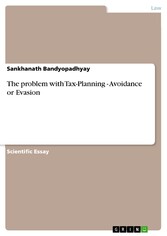Suchen und Finden
The problem with Tax-Planning - Avoidance or Evasion
Scientific Essay from the year 2012 in the subject Law - Tax / Fiscal Law, grade: _, Jawaharlal Nehru University (Centre for Budget and Governance Accountability), course: Economics(Public Finance & Taxation), language: English, abstract: The recent verdict by Supreme Court on Vodafone case generates fresh debates on whether India needs to review her existing legal provisions particularly with respect to offshore tax laws. In this context, formal treatment and clear demarcations between tax evasion, tax avoidance and tax planning practices are imperative. The Standing Committee on Finance in its 49th Report on Direct Taxes Code bill, 2010(submitted to Parliament on 9th march, 2012) recommended Controlled Foreign Corporations (CFC) rules, Advance Pricing Agreement (APA) along with General Anti Avoidance Rule(GAAR) provision to replace the Income Tax Act, 1961 as per the International Taxation Standard and also in line with the recent Chinese Corporate Income Tax (CIT) Law introduced in 2008 to deal with offshore transactions via holding companies. Whereas introduction of GAAR is essential given the limited applications of a specific or targeted anti avoidance rule, the Committee also acknowledges the need for an appropriate Dispute Resolution Panel (DRP) as GAAR might result in a disproportionate discretionary power for the Income tax authority. The appropriate application of GAAR provision assumes a crucial role, in particular with countries lacking any Limitations of Benefit (LOB) clause (e.g. Mauritius) with India. Before entering into litigation, it might be beneficial to settle tax disputes through a bilateral negotiation in the form of Mutual Agreement Procedure (MAP), where tax authorities of the respective countries negotiate to settle disputes in a cordial manner.
Alle Preise verstehen sich inklusive der gesetzlichen MwSt.







